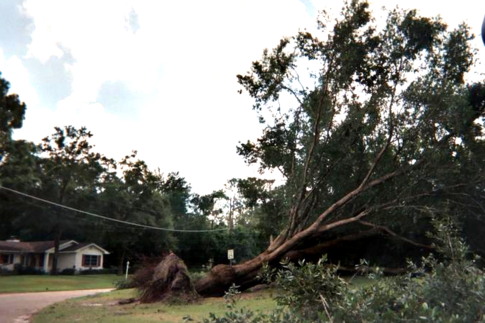~Community Association Law~
~ TIMESHARE~Appellate Practice~
JC Fuller, PA AV Rated
Florida Supreme Court Certified Arbitrator
407-641-5292
407-964-1487/fax
STRAIGHT TALK FROM THE TRENCHES
ARB/ARC
Its yard day
Saturday morning before the sun rises, Tim The Toolman Taylor dusts
off his air-compressor and fires up his tools. Before the birds can begin
their singing, jack-hammering commences and, with dreams of palatial
splendor, Toolman is fully engaged.
As the dust cloud forms amid all of the activity, nervous neighbors peak
out from behind the blinds. Ms. Molly Busybody wonders whether
Toolman has permission to make any changes. Janet Idontgiveada_it
prods her spouse from his easy chair, takes our her pen and begins to
make a "honey do fix-it list".
Matthew Icandobetterthanyou raises his garage door and trots out a
myriad of saws and trimmers. Not to be outdone, Ron Moveonoverson
pops open a can of fresh purple paint. Freddy Attheready's telephone
begins to ring. As President of the Association he frantically thinks of
ways to avoid addressing home improvement issues at such an early hour.
Ah, the neighborhood is in full swing.
~
Florida law actually addresses association home improvement matters in Chapter 720 of the Florida Statutes. First of all, an Association can only regulate, enforce and approve the location, size, type, or appearance of any structure or other improvement to the extent authorized by the declaration of covenants or other authorized published guidelines and standards. 720.3035(1).
Furthermore, if the declaration of covenants or other authorized published guidelines and standards allow a certain material, size of structure or improvement, design of the structure or improvement, or location of the structure or improvement; neither the association nor any architectural review board (ARB) nor any architectural review committee (ARC) nor other such similar committee can restrict the right of an owner to select from those authorized options. 720.3035(2)
Associations need to properly supervise these improvements in order to preserve the existing neighborhood continuity. When the character of a community changes as a result of the failure of the Association to enforce ARB/ARC restrictions, or as a result of approved modifications, those changes often become permanent.
Courts have ruled that ARB/ARC committees do not have power or discretion to impose only one style over another, based purely on aesthetic concepts. Thus, in the absence of existing patterns or architectural schemes in particular developments which puts prospective purchasers on notice that only one kind of style will be allowed, either in recorded restrictions or de facto from modified building scheme built on subdivision, associations are powerless to establish and enforce aesthetic restrictions. (Young v. Tortoise Island Homeowner's Ass'n, Inc. 511 So.2d 381 (Fla. 5th DCA 1987).) In these situations, ARB/ARC enforcement is often seen as arbitrary.
Arbitrary creation and enforcement of any rule is prohibited.
Selective enforcement of a rule or a standard is likewise prohibited.
Selective enforcement happens when an association turns a blind eye to one neighbor for a rule violation, and enforces that very same rule against another neighbor. Selective enforcement applies apples to apples and oranges to oranges. In other words, an association that chooses not to enforce a landscaping restriction against one neighbor is not engaging in selective enforcement when enforcing a parking restriction against another.
Associations need to properly enforce maintenance and ARB/ARC rules regarding property upkeep. Failure to do so can drag a neighborhood (and its property values) down. Deterioration of a neighborhood can happen quickly.
Florida Friendly Landscaping is quite the hot topic. Basically, Florida law provides that no HOA (or condo association) can prohibit a person from installing an environmentally friendly landscape; and no association can require that an owner install a landscaping feature whose maintenance will require an owner to violate a water restriction.
Some owners have interpreted this law to mean that all ARB/ARC standards are eliminated, and owners are free to remove all sod and install mulch or rocks at will.
However, so long as an association offers a cost-effective Florida Friendly option that is similar if not identical to the neighborhood landscaping plan, an owner is neither being denied the opportunity to install Florida Friendly landscape, nor being forced to install a landscape whose maintenance will require a violation of water restrictions.
For assistance with ARB/ARC issues, rules and maintenance enforcement , please consult with your association's attorney .
-Joyce C. Fuller, Esq.
------------------------------------------------------
AVOID THE NEED FOR
SLEUTHING
Open ARB/ARC Meetings
Many Associations are surprised to learn that ARB/ARC meetings must be open to the membership. In fact, albeit buried within a densely worded part of the law, the requirement for all ARB/ARC meetings to be properly noticed and held in the open is clear. I think that the reasoning behind the law is equally clear. When someone in a community files a request to change the appearance of a property, the surrounding neighbors are entitled to be informed and to participate (observe and comment; not vote) in the approval process.
Additionally, when a property owner wants to modify a landscape or building, that owner is entitled to be present when the decision on that request is being made. Due process rights for property owners are sacrosanct. In other words, the rights to own and use property are precious under the law.
Any meeting of a committee charged with approving an ARB/ARC application must comply with the meeting and notice requirements which pertain to board meetings.
Enjoy our Video on ARB Sleuthing!
FLORIDA STATUTE: 720.303 (a) A meeting of the board of directors of an association occurs whenever a quorum of the board gathers to conduct association business. All meetings of the board must be open to all members except for meetings between the board and its attorney with respect to proposed or pending litigation where the contents of the discussion would otherwise be governed by the attorney-client privilege. The provisions of this subsection shall also apply to the meetings of any committee or other similar body when a final decision will be made regarding the expenditure of association funds and to meetings of any body vested with the power to approve or disapprove architectural decisions with respect to a specific parcel of residential property owned by a member of the community.
b) Members have the right to attend all meetings of the board and to speak on any matter on the agenda for at least 3 minutes. The association may adopt written reasonable rules expanding the right of members to speak and governing the frequency, duration, and other manner of member statements, which rules must be consistent with this paragraph and may include a sign-up sheet for members wishing to speak.
Joyce Fuller, Esq.
_____________________________________
WHY CLIENTS MUST TELL THEIR LAWYER EVERYTHING
AND HAVE NO SECRETS
...a true story
A good lawyer never asks a question in court or in an administrative proceeding, without knowing the answer. This means that lawyers must know all of the facts of a situation, the good the bad and the ugly, in order to properly defend or advocate for a client.
And this means each and every fact no matter how insignificant it may seem. This is why it is critical to hire a trustworthy lawyer who keeps a client's secrets, guards a client's dignity, and preserves a client's honor while advocating in the case.
Above all, the client must trust the lawyer.
A True Story As Told to Me by a Colleague:
LAWYER: "Ok so I was preparing for this administrative hearing in front of an Arbitrator with the Florida Department of Business and Professional Regulation. I represented a Condominium Association.
The matter involved defending the accusation that the Association had failed to timely provide a homeowner access to its corporate records within the statutory timeframe: 10 days.
My star witness, of course was my client's property manager.
In preparation for the hearing, I interviewed my witness. We discussed the records and the issues involved in the case. I was very comfortable with my client's case.
After we hammered out all of the facts surrounding the records, I asked the manager if there was anything that I should know about him, and his management of the association.
He could not think of anything.
I told the manager that I needed to know if there were any situations in his past, any embarrassing moments, any criminal or civil matters or accusations against him, anything at all no matter how small or unpleasant. I assured this manager that whatever he told me would be confidential. That I could be trusted with his secrets. And that I wanted to make sure there were no "surprises" out there that the opposing lawyer could spring on us at the hearing to challenge his credibility or trustworthiness as a witness.
Nope. Nothing except a speeding ticket.
Several weeks later, we had the hearing. I called him to the witness stand and asked him the standard questions. He did fine. The opposing lawyer was uncomfortably quiet...... not many objections to my questions of my witness.
And then it was his turn.
"Mr. 'x'," he began, "Isn't it true that on one occasion you discovered a homeowner who had displayed an unauthorized for sale sign in his window of the condominium?"
"Yes."
"And isn't it true", he continued, "that you purchased a can of black spray paint and painted over the entire window in order to cover up that sign?"
......oh no, oh God no, ...SAY NO.... I thought to myself as my stomach began to sink into my shoes......
"Yes"
"And isn't it true", continued my opposing lawyer, "that you were recently found naked running throughout the community, and that the police department was called and that you were arrested for indecent exposure and subsequently hospitalized in a psychiatric facility against your will?"
"Yes"
And then, my case was over."
For questions about hiring a qualified trustworthy lawyer, please consult with the
Florida Bar Association.
Joyce C. Fuller, Esquire
________________________
Associations are Parties too!
The Third District Court of Appeal recently upheld sanctions awarded to a condominium association against a foreclosing bank for failing to provide a condominium association with notice and an opportunity to be heard when the bank asked a court to cancel a judicial sale.
In the case of Jade Winds Association Inc. v. Citibank N.A. et al, the appellate court ruled that the bank violated the procedural due process rights of the condominium association by failing to serve the association's lawyer with notice of its motion to cancel a foreclosure sale, even though the motion was filed on an emergency basis. The association's lawyer had actively participated in the foreclosure action, the bank made no attempt to notify association's lawyer of the motion, and the bank knew that its actions were inappropriate, as it had already been sanctioned for failing to notify association of its first motion to cancel the sale.
"A basic element of procedural due process is notice and an opportunity to be heard. . . . ("A fundamental requirement of due process is 'notice reasonably calculated, under all the circumstances, to apprise interested parties ... and afford them an opportunity to present their objections.' ") (quoting Mullane v. Cent. Hanover Bank & Trust Co., 339 U.S. 306, 314, 70 S.Ct. 652, 94 L.Ed. 865 (1950)). Further, Florida Rule of Civil Procedure 1.080(a) provides: "Unless the court otherwise orders, every pleading subsequent to the initial pleading and every other paper filed in the action, except applications for witness subpoena, shall be served on each party. ..." (emphasis added). Further, rule 1.080(b) explains that when a party is represented by an attorney, "service shall be made upon the attorney unless service upon the party is ordered by the court."
The appellate court went on to cite the Florida Supreme Court Task Force on Residential Mortgage Foreclosure Cases explaining that many foreclosure sales set by the final judgment and handled by the clerks of court are the subject of vague last-minute motions by banks, to reset sales without giving any specific information as to why the sale is being reset. It is important to know why sales are being reset in order to determine when they can be properly reset or whether the sales process is being abused. This is designed to promote effective case management and keep properties out of extended limbo between final judgment and sale. (Jade Winds at p. 823)
Jade Winds Association, Inc., v. Citibank N.A. et al , 63 So.3d 819
(Fla. 3 DCA 2011)
If you have any questions on whether or not to pursue a legal sanction against any party, please consult with your attorney or obtain an independent second opinion by a qualified experienced lawyer.
-Joyce Fuller, Esq.
______________________________
If a Tree Falls, Who has to Pick it Up?
(Hurricane Charlie 2004 Rolling Hills Golf Course Longwood, Florida)
One common mis-perception about falling trees is that the property owner upon which the tree was growing is responsible for removing that tree when it falls onto another property. ..... kind of like when a boy throws a ball through (and breaks) a glass window and must be responsible to pay for the repair. That misunderstanding continues with the belief that the originating property owner is also responsible to pay for damages to other properties caused by that fallen tree.
Florida law adopts the opposing position that when "acts of nature" or "acts of God" cause a healthy tree to fall, as did hurricane Charlie in 2004, the originating owner is only responsible to remove the portion of the tree on his/her property, and is not responsible to remove the tree from or make repairs to the property of others.[1]
If a healthy tree has fallen onto your property from your neighbor's yard, you will likely be the party responsible for cleaning up your yard and repairing the damages to your property. And, if you don't remove that fallen tree from your property, you could be held responsible for any injury that results on your property as a result of that fallen tree.[2]
It is important for all property owners including community associations owning common property, to properly maintain the landscape and remove all dangerous conditions, even if they were initially caused by a tree falling from an adjoining property.
This is why Florida law allows a property owner to trim that portion of a neighbor's tree that is encroaching onto his/her property. By trimming an encroaching healthy tree, a property owner is mitigating (lessening) possible damage should that tree one day fall.
As hurricane season is upon us once more, it is a good time to meander outside and take stock of the trees on our individual lots. All healthy trees should be trimmed and regularly maintained. All unhealthy trees should be treated or, if they cannot be safely saved, removed. Allowing an unhealthy tree to remain on a property poses a known danger to surrounding neighbors.
A property owner who knowingly allows a dead tree to remain on a property, endangering others, could be liable for ALL damages to others, should that dead tree fall.[3]
All doubt regarding whether a tree is safe and healthy should be resolved by a qualified arborist.
***
[1] Richmond v. General Eng'g Enters. Co., 454 So.2d 16 (Fla. 3d DCA 1984); Knepper v. Slovak, 31 Fla.Supp. 131 (Fla. 15th Cir.Ct.1968); see Sterling v. Weinstein, 75 A.2d 144 (D.C.1950); Schwalbach v. Forest Lawn Memorial Park, 687 S.W.2d 551 (Ky.Ct.App.1985); Melnick v. C.S.X. Corp., 68 Md.App. 107, 510 A.2d 592 (Ct.Spec.App.1986), cert. granted, 307 Md. 753, 517 A.2d 102 (1986); Michalson v. Nutting, 275 Mass. 232, 175 N.E. 490 (1931) (leading case); Hasapopoulos v. Murphy, 689 S.W.2d 118 (Mo.Ct.App.1985); Loggia v. Grobe, 128 Misc.2d 973, 491 N.Y.S.2d 973 (Dist.Ct.1985)
[2] Regency Lake Apartments Associates, Ltd. v. French 590 So.2d 970 (Fla. 1st DCA 1991).
[3] Vann v. Bailey 709 So.2d 615 (5th DCA 1998); and Davis v. Ivey, 112 So. 264, 271 (1927) Florida Supreme Court holding that where a force of nature combines with a condition created by the defendant's negligence and produces injury, the defendant may be liable.
-Joyce Fuller
_____________________________________
The contents of this website are for educational purposes and do not constitute legal advice.
Please seek the advice of a lawyer.
Media best if opened with Internet Explorer 64 bit
SAFETY TIPS
SAFEGUARD YOUR CREDIT CARDS
As technology advances, personal information continues to be at risk. This is because as we are quick to demand conveniences, we neglect to anticipate security risks until a crisis occurs.
Many credit and debit cards contain a RFID chip which uses radio signals in order to transmit card information to a card swipe. This convenience allows the user to charge a purchase on the card without having to run the card through the swipe machine. The customer merely waives the card in front of the device.
Aaaa convenient, right?
Wrong.
Seems that there is another nice little device that can be purchased online for around $100 that will easily and remotely intercept the RFID signal and download all card information. With that card information, a new card can be quickly and easily made.
What can you do to avoid this risk?
1. IDENTIFY
Look at your card. Do you see the words: BLINK or PAY PASS or PAY WAVE or the symbol ((( on the card? If so, this is an
RFID card and your information is at risk.
2. PROTECT
Take aluminum foil and wrap your card in it. This will prevent the signals from being intercepted.
Purchase a card cover which will accomplish the same goal as the aluminum foil.
3. DEMAND A NEW CARD
Tell your financial institution that you do not want an RFID card.
BEWARE THE BUG MAN
A TRUE STORY
My neighbor's mother lives in a gated South Florida community -- a mandatory Homeowners Association.
Recently my neighbor's mother, who is incidentally caring for her elderly ailing bedridden husband, heard a knock on her front door. She answered the door to see a uniformed pest control employee with standard equipment and an insignia with company logo on the shirt.
"Good morning maam" said the bugman. "Your Homeowners Association has hired me to take care of some bugs in your community and I noticed a rather large nest of flying insects on the side of your home. Would you mind coming outside for a minute so I can show them to you?" ....
Innocently she agreed and, leaving her sleeping husband inside alone, she went outside with the bugman. Sure enough, there was a nest of some sort of insect on the side of her home. The two discussed the situation, and within five minutes, the bugman shook her hand, wished her well, and went back to his truck to grab the supplies that he needed in order to spray the nest.
One small problem: he was no bugman.
My friend's mother learned that within that quick 5 minutes, while she was distracted by the bugman, an accomplice entered the unlocked front door and quickly ran through the inside of her home stealing all of her family jewelry and anything else of value that could be quickly and easily pocketed.
Fortunately her ailing husband was not harmed.
When she ran to the front door, the bugman had left the community.
Property managers and community association Boards routinely hire vendors to maintain a community. It is honestly commonplace for a vendor (landscaper, pest control person, security or other) to ring a front door bell in order to discuss a community situation with a homeowner. Here are a few tips tp help owners and residents to remain safe in these situations:
1. DO NOT OPEN THE DOOR. If you see someone in a uniform that you do not personally know, call the management company or a board member to make sure that the vendor is truly authorized to be working in your community.
2. If the manager or board member is not available, DO NOT OPEN THE DOOR. Tell the vendor to make an appointment with you to return to discuss the situation. If you make said appointment, contact your property manager or board member BEFORE the appointment to verify the identity of the vendor. If possible, have the manager or board member attend the scheduled meeting with you.
3. DO NOT GO OUTSIDE WITH THE VENDOR ALONE. Always have a buddy with you, whether it is a neighbor, manager or board member.
4. ALWAYS KEEP DOORS AND WINDOWS LOCKED. This way, if you are at a meeting with the board member and/or neighbor and/or manager with the vendor and the vendor is a criminal, your house will be protected.
5. ALWAYS CONTACT LOCAL LAW ENFORCEMENT if you see something that makes you feel uncomfortable. Law enforcement will tell you 100% of the time that it is better to be safe than sorry.









